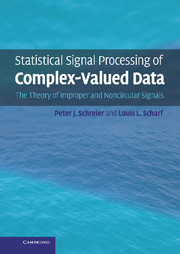Book contents
- Frontmatter
- Contents
- Preface
- Notation
- Part I Introduction
- Part II Complex random vectors
- 3 Second-order description of complex random vectors
- 4 Correlation analysis
- 5 Estimation
- 6 Performance bounds for parameter estimation
- 7 Detection
- Part III Complex random processes
- Appendix 1 Rudiments of matrix analysis
- Appendix 2 Complex differential calculus (Wirtinger calculus)
- Appendix 3 Introduction to majorization
- References
- Index
5 - Estimation
from Part II - Complex random vectors
Published online by Cambridge University Press: 25 January 2011
- Frontmatter
- Contents
- Preface
- Notation
- Part I Introduction
- Part II Complex random vectors
- 3 Second-order description of complex random vectors
- 4 Correlation analysis
- 5 Estimation
- 6 Performance bounds for parameter estimation
- 7 Detection
- Part III Complex random processes
- Appendix 1 Rudiments of matrix analysis
- Appendix 2 Complex differential calculus (Wirtinger calculus)
- Appendix 3 Introduction to majorization
- References
- Index
Summary
One of the most important applications of probability in science and engineering is to the theory of statistical inference, wherein the problem is to draw defensible conclusions from experimental evidence. The three main branches of statistical inference are parameter estimation, hypothesis testing, and time-series analysis. Or, as we say in the engineering sciences, the three main branches of statistical signal processing are estimation, detection, and signal analysis.
A common problem is to estimate the value of a parameter, or vector of parameters, from a sequence of measurements. The underlying probability law that governs the generation of the measurements depends on the parameter. Engineering language would say that a source of information, loosely speaking, generates a signal x and a channel carries this information in a measurement y, whose probability law p(y∣x) depends on the signal. There is usually little controversy over this aspect of the problem because the measurement scheme generally determines the probability law. There is, however, a philosophical divide about the modeling of the signal x. Frequentists adopt the point of view that to assign a probability law to the signal assumes too much. They argue that the signal should be treated as an unknown constant and the data should be allowed to speak for itself. Bayesians argue that the signal should be treated as a random variable whose prior probability distribution is to be updated to a posterior distribution as measurements are made.
- Type
- Chapter
- Information
- Statistical Signal Processing of Complex-Valued DataThe Theory of Improper and Noncircular Signals, pp. 116 - 150Publisher: Cambridge University PressPrint publication year: 2010



